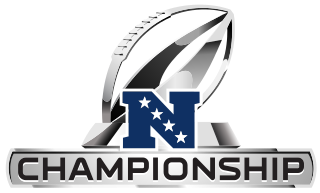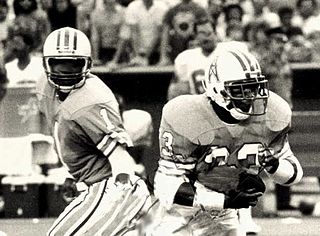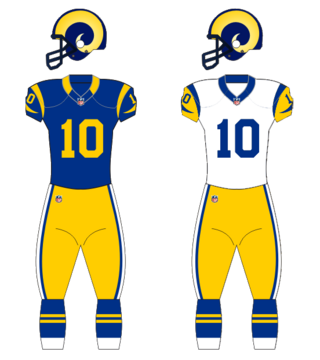Related Research Articles

The NFC Championship Game is the annual championship game of the National Football Conference (NFC) and one of the two semifinal playoff games of the National Football League (NFL), the largest professional American football league in the world. The game is played on the last Sunday in January by the two remaining playoff teams, following the NFC postseason's first two rounds. The NFC champion then advances to face the winner of the AFC Championship Game in the Super Bowl.
The National Football Conference – Western Division or NFC West is one of the four divisions of the National Football Conference (NFC) in the National Football League (NFL). It currently has four members: the Arizona Cardinals, the Los Angeles Rams, the San Francisco 49ers, and the Seattle Seahawks.
The 1997 NFL season was the 78th regular season of the National Football League (NFL). The Oilers relocated from Houston, Texas to Nashville, Tennessee. The newly renamed Tennessee Oilers played their home games during this season at the Liberty Bowl Memorial Stadium in Memphis, Tennessee while construction of a new stadium in Nashville started. Houston would rejoin the NFL with the expansion Texans in 2002.
The 1995 NFL season was the 76th regular season of the National Football League (NFL). The league expanded to 30 teams with the addition of the Carolina Panthers and the Jacksonville Jaguars. The two expansion teams were slotted into the two remaining divisions that previously had only four teams : the AFC Central (Jaguars) and the NFC West (Panthers).

The 1988 NFL season was the 69th regular season of the National Football League. The Cardinals relocated from St. Louis, Missouri, to the Phoenix, Arizona, area becoming the Phoenix Cardinals but remained in the NFC East division. The playoff races came down to the regular season's final week, with the Seattle Seahawks winning the AFC West by one game, and the Philadelphia Eagles and San Francisco 49ers winning their respective divisions in a five-way tie, with the New Orleans Saints and New York Giants losing the NFC Wild Card berth to the Los Angeles Rams on tiebreakers.
The 1967 NFL season was the 48th regular season of the National Football League. The league expanded to 16 teams with the addition of the New Orleans Saints.
This article details the history of the New Orleans Saints, an American football team in the NFL, which was organized in 1967 and is based in New Orleans, Louisiana.
The 1986 Atlanta Falcons season was the franchise's 21st season in the National Football League (NFL). It began with moderate expectations. Head coach Dan Henning was going into his fourth year having failed to post a record above .500 in any of his first three seasons. Local media, including the Atlanta Journal-Constitution, saw it as Henning's last chance to save his head coaching job. Atlanta entered the season led by, among others, Gerald Riggs, Scott Case, Bill Fralic and Jeff Van Note. David Archer was the starting quarterback heading into the season.
NFL's Greatest Games is a series of television programs that air on NFL Network, ESPN and related networks. They are condensed versions of some of the most famous games in the history of the National Football League, using footage and sound captured by NFL Films, as well as original interviews. All installments produced before 2015 are 90 minutes in length, and are presented with a title in respect to the game being featured. Starting in 2015, new installments produced run for either 30 minutes, 60 minutes, or 90 minutes, and no longer have a title beyond the actual game itself that is featured.
NFL playoff results is a listing of the year-by-year results of the NFL Playoff games to determine the final two teams for the championship game. The winners of those games are listed in NFL Championship Game article.
The overall franchise records are shown in the last table.
The San Francisco 49ers are the first major league professional sports franchise to be based in San Francisco, and one of the first professional sports teams based on the West Coast of the United States.

The 1993 Los Angeles Rams season was the team's 56th season in the National Football League and the 48th in Los Angeles.
The 1971 Los Angeles Rams season was the team's 34th year with the National Football League, and the 26th season in Los Angeles. The team looked to improve on its 9–4–1 record from 1970, but finished only one game below their goal, as they finished 8–5–1 and finished 2nd in the NFC West, behind the San Francisco 49ers (9–5).

The 1994 season was the San Francisco 49ers' 45th in the National Football League (NFL), their 49th overall, and their sixth under head coach George Seifert. This season was highlighted by a victory in Super Bowl XXIX. The championship made San Francisco the first team to win five Super Bowls. After losing to the Dallas Cowboys in the previous two conference championship games, the 49ers made significant acquisitions in the 1994 free agent market. This included the signing of two-sport star Deion Sanders and Cowboys linebacker Ken Norton, Jr. Sanders had a major impact on the team's success, winning the NFL Defensive Player of the Year Award and recording six interceptions. The 49ers won their division, the NFC West, for the eighth time in nine seasons.

The 2001 San Francisco 49ers season was the franchise's 56th season and 52nd in the National Football League (NFL). The 49ers rebounded from two losing seasons in 1999 and 2000, achieving their first winning season under quarterback Jeff Garcia and returning to the playoffs for the first time since 1998 behind a strong 12–4 record. However, the 49ers failed to progress further, falling 25–15 to the Green Bay Packers in the wild-card round. This was the fourth time out of five games that they had lost to the Packers in the playoffs since the 1995 season. However, they have won all five meetings since then. This for first time since 1984 Jerry Rice was not on the opening day roster.

NaVorro Roderick Bowman is an American former professional football player who was a linebacker for eight seasons in the National Football League (NFL). He is currently the linebackers coach for the Los Angeles Chargers. He played college football for the Penn State Nittany Lions and was selected by the San Francisco 49ers in the third round of the 2010 NFL draft. Bowman was also a member of the Oakland Raiders.

The 2011 season was the New Orleans Saints' 45th in the National Football League (NFL), their 36th playing home games at the Mercedes-Benz Superdome and their sixth under head coach Sean Payton. In Week 16, Drew Brees broke the single-season passing record previously held by Dan Marino; Brees ended the season with 5,476 passing yards, an NFL record. The team also broke the record for offensive yards from scrimmage with 7,474 and Darren Sproles broke the record for all purpose yards, with 2,696. The Saints also finished second in scoring for total points with 547, and finished second for points per game with 34.2 points and sacks with 24.
References
- ↑ The Football Database. Retrieved 2018-Dec-14.